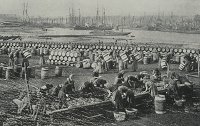Herring Home | Sale and Processing of herring | Next
White herring curing: the curers

The curers played a central role in the organisation of the herring fishery. Some of the major firms such as James Methuen of Leith operated a series of stations at the main ports, but there were also smaller local curers at all the ports. The curers operated from curing yards from where they organised and oversaw all the activities. In particular they had to ensure that enough salt was delivered in time for the catches of herring landed on the quayside. They also had to arrange for the barrel-makers to be ready. Finally, once the process of filling the barrels was complete they would organise export by larger ships.

The curers purchased fish, mainly through a system of engagements. This was a system where the curer paid a guaranteed price to the crew of a fishing boat. As well as having agreements with the boat crews, the curers also had agreements with the gutters and packers.
The curers and their teams moved around the Coast of Scotland and England. In June they would start in the Shetlands, Wick or the West Highlands moving round to Fraserburgh. In September and October they went to the East Anglian ports of Yarmouth and Lowestoft where they remained until almost Christmas. They made the same trip by land that the local men in their boats made by sea.